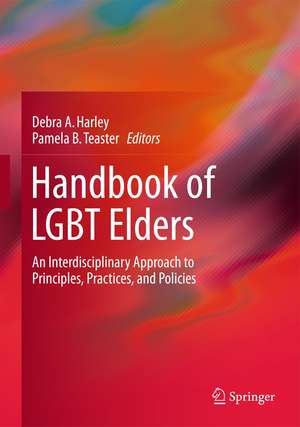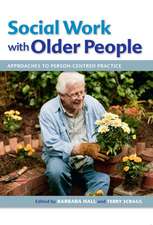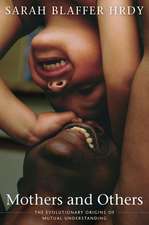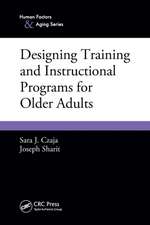Handbook of LGBT Elders: An Interdisciplinary Approach to Principles, Practices, and Policies
Editat de Debra A. Harley, Pamela B. Teasteren Limba Engleză Hardback – 14 aug 2015
Specific chapters highlight challenges and resiliencies impacting subpopulations (e.g., racial groups, veterans, immigrants), examine employment and advocacy issues, discuss later-life concerns in context and offer guidelines for relevant, ethical practice. Contributors represent a wide range of fields from psychiatry and gerontology to public health and public policy, reflecting the scope and needs of this diverse and complex population.
Among the topics in the Handbook:
Family relationships of older LGBT adults.
- The intersection of identities: race, age, sexuality and care network.
- Bisexuality: an invisible community among LGBT elders.
- Implications of the Supreme Court ruling on same-sex marriage.
- No money, no work and you're old.
- Disabilities among LGBT elders: responses of medicine, public health, rehabilitation and social work.
| Toate formatele și edițiile | Preț | Express |
|---|---|---|
| Paperback (1) | 719.86 lei 6-8 săpt. | |
| Springer International Publishing – 22 oct 2016 | 719.86 lei 6-8 săpt. | |
| Hardback (1) | 1209.55 lei 6-8 săpt. | |
| Springer International Publishing – 14 aug 2015 | 1209.55 lei 6-8 săpt. |
Preț: 1209.55 lei
Preț vechi: 1422.99 lei
-15% Nou
Puncte Express: 1814
Preț estimativ în valută:
231.56€ • 241.61$ • 194.10£
231.56€ • 241.61$ • 194.10£
Carte tipărită la comandă
Livrare economică 12-26 martie
Preluare comenzi: 021 569.72.76
Specificații
ISBN-13: 9783319036229
ISBN-10: 331903622X
Pagini: 1000
Ilustrații: XVIII, 691 p. 22 illus.
Dimensiuni: 178 x 254 x 45 mm
Greutate: 14.63 kg
Ediția:1st ed. 2015
Editura: Springer International Publishing
Colecția Springer
Locul publicării:Cham, Switzerland
ISBN-10: 331903622X
Pagini: 1000
Ilustrații: XVIII, 691 p. 22 illus.
Dimensiuni: 178 x 254 x 45 mm
Greutate: 14.63 kg
Ediția:1st ed. 2015
Editura: Springer International Publishing
Colecția Springer
Locul publicării:Cham, Switzerland
Public țintă
GraduateCuprins
Foreword.- I. Foundations of Aging and Sexual Identities.- Theories, Constructs and Applications in Working with LGBT Elders in Human Services.- Sexual Minority Status and Aging.- Late Adulthood Development.- Deconstructing Homophobia, Heterosexism, Sexism and Ageism.- The Intersection of Identities: Race, Age, Sexuality and Care Network.- II. Multicultural, International and Select Populations of LGBT Elders.- African American and Black LGBT Elders.- American Indian LGBT Elders.- Asian and Pacific Island LGBT Elders.- European LGBT Elders.- Hispanic/Latino LGBT Elders.- Elder LGBT Veterans.- LGBT [Ex]-Offender Populations.- Immigrant LGBT Elders.- Transgender Elders.- Bisexuality: An Invisible Community Among LGBT Elders.- III. Mistreatment and Victimization of Older LGBT.- Aging and Mistreatment: An Overview.- Mistreatment and Victimization of LGBT Elders.- Elder Bullies and Impact on LGBT Elders.- IV. Health Care and Mental Health.- Impact of Health Care Reform on LGBT Elders.- Healthcare Practices with LGBT Elders.- LGBT Elders in Nursing Homes, Long-Term Care Facilities and Residential Communities.- End-of-life Issues for LGBT Elders.- Mental Health Counseling of LGBT Elders.- Substance Abuse Intervention with LGBT Elders.- V. Policy, Legal and Ethical Issues.- Implications of the Supreme Court Ruling on Same-Sex Marriage.- Ethical Standards and Practices In Service Delivery.- VI. Family and Community.- LGBT Elders in Rural Settings.- Law Enforcement and Public Safety of LGBT Elders.- The Role of Clergy in Addressing the Needs of LGBT Elders.- LGBT Issues in the Workplace: The Intersection of Ageism and Sexual Identity.- Recreation and Leisure.- VII. Counseling and Human Services Delivery.- Counseling LGBT Elders.- Advocacy and Community Needs Assessment.- Disabilities Among LGBT Elders.- Trends, Future Directions and Implications for Policy, Practice and Research on LGBT Elders.
Notă biografică
Debra A. Harley, Ph.D., CRC, LPC, is a professor in the Department of Early Childhood, Special Education and Rehabilitation Counseling at the University of Kentucky (UK) and holds the distinction of Provost’s Distinguished Service Professor. She is past editor of the Journal of Rehabilitation Counseling and the Journal of Rehabilitation Administration (JRA) and is guest editor of numerous special issues of rehabilitation journals and a member of the editorial board of JRA and a reviewer for the Journal of AIDS and HIV Research and WORK: A Journal of Prevention, Assessment & Rehabilitation. She is co-editor of a book, Contemporary Mental Health Issues Among African Americans. Professor Harley has published over 80 refereed articles and 26 book chapters in the areas of cultural diversity, gender issues, LGBT populations, substance abuse and ethics. Professor Harley has served on the certification and the accreditation boards for rehabilitation counselors and rehabilitation counselor education programs and is affiliate faculty with the Department of Gender and Women’s Studies, the Center Research on Research on Violence Against Women and the Human Development Institute at UK.
Pamela B. Teaster, Ph.D., is a professor in the Department of Health Behavior in the College of Public Health at the University of Kentucky. Professor Teaster is Director of the Ohio Valley Appalachia Regional Geriatric Education Center and Director of Doctoral Studies for the College of Public Health. She directs the Kentucky Justice Center for Elders and Vulnerable Adults and serves on the editorial boards of the journal of Applied Gerontology and the Journal of Elder Abuse and Neglect. Professor Teaster is a Fellow of the Gerontological Society of America and the Association for gerontology in Higher Education. She has published over 100 refereed articles and reports on aging and mistreatment, intimate partner violence of aging women and sexual abuse of older women.Professor Teaster is an affiliate faculty of the Program for Bioethics and the Center Research on Research on Violence Against Women.
Pamela B. Teaster, Ph.D., is a professor in the Department of Health Behavior in the College of Public Health at the University of Kentucky. Professor Teaster is Director of the Ohio Valley Appalachia Regional Geriatric Education Center and Director of Doctoral Studies for the College of Public Health. She directs the Kentucky Justice Center for Elders and Vulnerable Adults and serves on the editorial boards of the journal of Applied Gerontology and the Journal of Elder Abuse and Neglect. Professor Teaster is a Fellow of the Gerontological Society of America and the Association for gerontology in Higher Education. She has published over 100 refereed articles and reports on aging and mistreatment, intimate partner violence of aging women and sexual abuse of older women.Professor Teaster is an affiliate faculty of the Program for Bioethics and the Center Research on Research on Violence Against Women.
Textul de pe ultima copertă
This groundbreaking resource presents a wealth of findings and perspectives previously unseen in the LGBT literature. Its focus on psychological, sociopolitical, and care delivery issues affecting LGBT elders reveals both the nuanced interplay between diverse sources of identity and multiple sources of stigma and discrimination.
Specific chapters highlight challenges and resiliencies impacting subpopulations (e.g., racial groups, veterans, immigrants), examine employment and advocacy issues, discuss later-life concerns in context, and offer guidelines for relevant, ethical practice. Contributors represent a wide range of fields from psychiatry and gerontology to public health and public policy, reflecting the scope and needs of this diverse and complex population.
Among the topics in the Handbook:
Handbook of LGBT Elders is an essential reference for mental health professionals, psychologists, and social workers who work with the LGBT community and the elderly, as well as researchers interested in the LGBT community and aging.
Specific chapters highlight challenges and resiliencies impacting subpopulations (e.g., racial groups, veterans, immigrants), examine employment and advocacy issues, discuss later-life concerns in context, and offer guidelines for relevant, ethical practice. Contributors represent a wide range of fields from psychiatry and gerontology to public health and public policy, reflecting the scope and needs of this diverse and complex population.
Among the topics in the Handbook:
- Family relationships of older LGBT adults.
- The intersection of identities: race, age, sexuality, and care network.
- Bisexuality: an invisible community among LGBT elders.
- Implications of the Supreme Court ruling on same-sex marriage.
- No money, no work, and you're old.
- Disabilities among LGBT elders: responses of medicine, public health, rehabilitation, and social work.
Handbook of LGBT Elders is an essential reference for mental health professionals, psychologists, and social workers who work with the LGBT community and the elderly, as well as researchers interested in the LGBT community and aging.
Caracteristici
Focuses on the elder population of the LGBT community Includes unique populations of LGBT elders (veterans, offender populations, rural settings) Provides interdisciplinary and international perspectives Explores models to improve service delivery Offers instructional features for classroom use Includes supplementary material: sn.pub/extras













